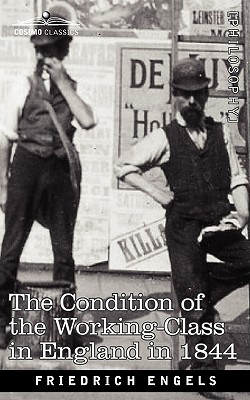
- We will send in 10–14 business days.
- Author: Friedrich Engels
- Publisher: Cosimo Classics
- ISBN-10: 1605203688
- ISBN-13: 9781605203683
- Format: 12.7 x 20.3 x 1.9 cm, minkšti viršeliai
- Language: English
- SAVE -10% with code: EXTRA
The Condition of the Working-Class in England in 1844 (e-book) (used book) | bookbook.eu
Reviews
Description
From 1842 to 1844, German philosopher FRIEDRICH ENGELS (1820-1895) lived in Manchester, England, and witnessed firsthand the impact of the nation's burgeoning Industrial Revolution on the poor. In this classic treatise, Engels documents, in what is today his best-known work, the terrible working conditions, rampant disease, overcrowded housing, child labor, and other horrors of the time. Originally intended for a German audience and translated for American readers in 1885 by American socialist, suffragette, and civil rights activist FLORENCE KELLEY WISCHNEWETZKY (1859-1932), this work has never been out of print. It remains a startling record of the era, and is must-reading for anyone wishing a deeper understanding of Karl Marx's Communist Manifesto, which Engels collaborated on with his friend only a few years later.
EXTRA 10 % discount with code: EXTRA
The promotion ends in 22d.09:12:30
The discount code is valid when purchasing from 10 €. Discounts do not stack.
- Author: Friedrich Engels
- Publisher: Cosimo Classics
- ISBN-10: 1605203688
- ISBN-13: 9781605203683
- Format: 12.7 x 20.3 x 1.9 cm, minkšti viršeliai
- Language: English English
From 1842 to 1844, German philosopher FRIEDRICH ENGELS (1820-1895) lived in Manchester, England, and witnessed firsthand the impact of the nation's burgeoning Industrial Revolution on the poor. In this classic treatise, Engels documents, in what is today his best-known work, the terrible working conditions, rampant disease, overcrowded housing, child labor, and other horrors of the time. Originally intended for a German audience and translated for American readers in 1885 by American socialist, suffragette, and civil rights activist FLORENCE KELLEY WISCHNEWETZKY (1859-1932), this work has never been out of print. It remains a startling record of the era, and is must-reading for anyone wishing a deeper understanding of Karl Marx's Communist Manifesto, which Engels collaborated on with his friend only a few years later.


Reviews